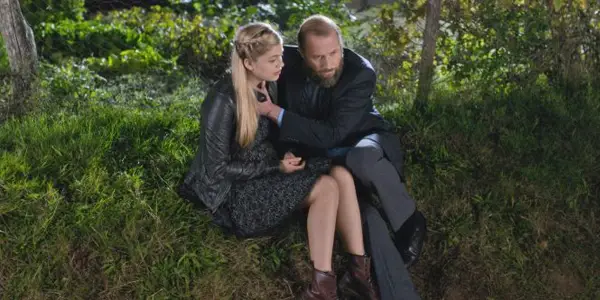LA FAMILLE BÉLIER: Singing The Same Old Tune

Alex is a 28 year-old West Australian who has a…
One of the hardest things to decide when reviewing a film is if the intentions behind the production feel genuine. One aspect that always arises during the Oscar/Award periods is actors doing roles or movies being made purely for “Oscar bait”. The idea of making a movie purely for the sake of gaining awards attention is somewhat cynical, but the transparency of movie production nowadays makes this something that sadly may have some truth behind it.
So if I feel a movie is made without a genuine love for the story, but purely to gain awards, does this detract from the entertainment derived from it? The Family Belier, (La Famille Bélier), to me, is a film with questionable intentions. It attempts to make a feel-good movie capitalising on a handicap, but its extremely generic plotting and juvenile humour really highlight the subpar film-making behind it, making its manufactured sentimentality and awards season indicators so glaringly obvious.
You’ve Heard This One Before
The Family Bélier follows the titular family, father Rodolphe (Francois Damiens) who runs the family’s farm, wife Gigi (Karin Viard) and their two children: son Quentin (Luca Gelberg) and daughter Paula (Louane Emera). The twist? The whole family is deaf. Except for Paula, who, due to her ability to communicate with deaf and hearing people, conducts most of the family’s business and is the central figure of the family.
Starting another school year, Paula is drawn towards joining the school choir, thanks to love-interest Gabriel (Ilian Bergala), where she finds out, through the encouragement of passionate music teacher Fabien (Eric Elmosnino), that she has a natural talent for singing. When Fabien gets Paula an audition to join a prestigious music school in Paris, Paula must decide between living her own future or be stuck helping her family out in their farm.

As you can tell by the film’s plotline, it sounds quite predictable. The process of a teenager growing up and deciding her future is one that has been done a million times onscreen and sadly this film doesn’t do anything new with it. In an attempt to flesh out the generic main story, the film crams in a whole bunch of different subplots that never click with each other, which ends up making the film feel like an overstuffed TV pilot.
The father Rodolphe decides to run for mayor, as his strong feelings towards farming and agriculture take the better of him when the current long-standing mayor announces he will be tearing down more nature to build another mall. You’d think the film would find a clever way to intertwine these two plots (Paula and her father), even if it was something about singing at one of his press events, but no, the plots never really touch in a way that feels organic.
The subplot is brought up repeatedly but then is forgotten at the end of the film, feeling like something that could’ve been cut out of the film all together and had no effect, apart from how significant running time it takes up. Other pointless subplots, such as Paula’s best friend Mathilde hooking up with Paula’s brother, even when Paula was vehemently against it, is given so much screen-time for absolute no reason. With no storytelling repercussions or significant meaning to any of the characters, it just drags the films slower towards its foreseeable ending.
Tone Deaf
For a feel-good film, I really disliked most of the characters in it. Paula, portrayed by young French reality star Louane Emera, does a good job with what she’s given. She’s mainly used for her singing abilities, but her acting talents are quite decent, as it’s always a gamble when casting singers in prominent acting roles. For every Tom Waits that kill onscreen, there’s always Britney Spears in Crossroads, showing the drastic drop in quality.
The problem was that I never bought the central characters as a loving family, between how they’re written and how the actors portrayed them, they seemed more like a foster home for deaf people than a committed family. Rodolphe and Gigi, the parents, come across as selfish, having no tact with their daughter as they openly talk about sex in front of her, constantly dote on her for everything and often act quite juvenile for people their age. It’s interesting to note that Rodolphe and Gigi are both portrayed by non-deaf actors, which is something that you can notice in the film.
Gigi, played by Karin Viard, goes so over the top in her comedic performance that it’s distracting. Constantly flailing and begging for attention onscreen, as the film goes on she becomes unbearable to watch, between Viard’s exaggerated sign language techniques and the character’s constantly selfish motivations, all I wanted was for Paula to leave the family immediately. I never felt she had to struggle with her decision because the film made that choice so obvious. Rodolphe is just as bad, smacking his daughter because she got her period, calling Obama handicapped for being African-American and openly ignoring his daughter’s requests because he wants to have sex with his wife again.
The characters in general are written as too unlikable for me to care for the syrupy ham-fisted sentimental ending. Quentin, played by Luca Gelberg, is the only deaf actor in the film and it shows, his performance is much more subtle and he felt like one of the only genuine actors in the film, even if he isn’t given much to do outside of openly hitting on his sister’s best friend.

The film feels quite disingenuous towards deaf people, as they are portrayed as selfish, needy people who are incredibly dependent on anyone with hearing abilities around them. The film’s pitch – a deaf family who has a daughter who can sing, sounds like an easy one to sell. The ironic nature of it, whilst combining the feel-good aspect with the handicap aspect, is one that has been proved popular in the past with films such as The Intouchables and The Sessions.
The film doesn’t feel loving towards its central figures, outside of the family, the only other deaf person shown is an overbearing oafish figure, who yells and disrupts everyone around him. Gigi openly states in the film that she hates people who can hear, but I doubt this is a sentiment shared by the deaf community. So I must question why they are portrayed so poorly, was it purely for the sake of comedy? The film plays up their deafness for laughs and the film renders them completely unusable in society without their daughter helping them out. It just feels completely disrespectful and makes me feel that they had the idea of deaf people purely for a gimmicky angle – the Oscar Bait syndrome.
Conclusion
At the end of the day, this was a feel-good film which didn’t make me feel good at all. Outside of that, it has nothing going for it. Whilst Louane Emera’s central performance is good and she genuinely has a great singing voice, the other figures are so unlikable and feel so manufactured for misplaced intentions that I walked away from the film dissecting its technical aspects rather than being purely won over by its sloppy sentimentality.
Between the film’s frequent juvenile jokes, the frequent redundant subplots and comically misguided performances, this is one film that seriously needed some work to flesh out what it wanted to do before going into production. Are we making fun of deaf people or are we falling in love with them? The film heavily points towards mocking them, as it frequently shows them as dependent, selfish people who if they try to do anything, such as run for mayor, will fail spectacularly.
The film’s final scene, a heart-tugging musical number by Paula, is so trying so hard to win the audience over, with close-ups on characters crying and lyrics that are too on the nose on its morals, the scene is the epitome for the entire film – trying to tug on the heartstrings and make us fall in love, but failing completely due to misguided intentions.
Which feel-good films really do the job for you?
La Famille Bélier was already released in December 2014 in France, and in September 2015 in the UK. No US release date has currently been set. Check other international release dates here.
Does content like this matter to you?
Become a Member and support film journalism. Unlock access to all of Film Inquiry`s great articles. Join a community of like-minded readers who are passionate about cinema - get access to our private members Network, give back to independent filmmakers, and more.









